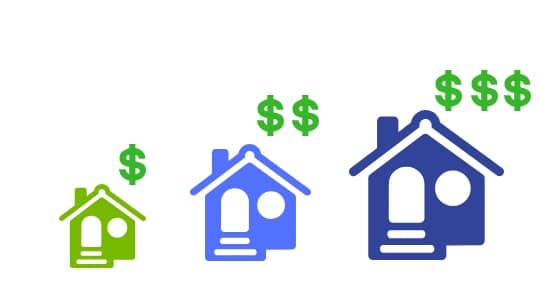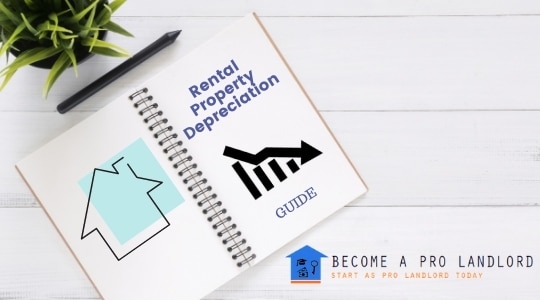Rental Property Depreciation | Residential Landlords Depreciation Guide
There is an unfair advantage with real estate and there’s a reason why it is called the world`s best asset class. The amount of tax deductions available for any rental property owner is huge. And if you still don`t know and are investing in rental properties solely for cash flow and appreciation. Then you are missing out on the biggest write-off available for a rental investor i.e. Rental Property Depreciation tax deduction.
The IRS allows you to depreciate your rental property on a year to year basis and has laid out specific guidelines around it. Rental Property Depreciation is available on the costs incurred towards building costs and capital improvements of your rental property.
What is Rental Property Depreciation?
The Rental Property Depreciation is the depreciation of rental property value as it loses its useful life over the years due to deterioration, age, wear and tear. Like any other business where you depreciate a business asset having useful life, rental property is also a business asset.
A rental property owner can depreciate a qualifying rental property over years on a cost basis by deducting the cost of the building and the improvements that are made to it over time.
Why does Rental Property Depreciation matter to you?
 Rental Property Depreciation is the biggest tax-deductible expense available for any real estate investor. And, if you are not harnessing it properly, you are missing an unfair advantage of investing in rentals.
Rental Property Depreciation is the biggest tax-deductible expense available for any real estate investor. And, if you are not harnessing it properly, you are missing an unfair advantage of investing in rentals.
Read: The other Advantages of investing in Rentals
Imagine investing in a business that is making losses every year; losses on paper but not in real terms. And you can deduct these losses to reduce your taxable income. Wouldn’t you take this opportunity of reducing something which exactly is not a true loss at all?
The cost of buying real estate is the biggest one-time expense for any real estate investor. And with rental property depreciation, you get to deduct part of this cost every year and reduce your taxable income.
Does Your Rental Property Qualify for Depreciation?
The IRS is strict on which rental property qualifies for depreciation. As a rental property owner, you need to take account of these guidelines carefully to avoid any kind of legal probe.
- Are you the true owner of your Rental Property even if it is mortgaged?
- Do you use the Property for Business to produce income?
- Does your Property have a usable life meaning it has something to deteriorate, or wear and tear?
- Is your Property useful life for more than a year?
“If you are a live-in landlord who is renting a room or some space in your primary residence, then you can only depreciate the area that is rented.”
The Rule of PAL
PAL denotes Passive Active Losses which means you can offset passive income against passive losses. If you earn income through any passive activity. Then you can offset this passive income by deducting the losses from the same and other passive business activities.
And if you see, Rental Property Depreciation is a loss in income through a passive activity.
You have a rental property that makes $17,000 annually every year after deducting all your expenses. So, you will report your income of $17,000 on your tax returns. But suppose if you have two rental properties, one that is making $17,000 profit and the other that has made an $8000 annual loss. Your adjusted gross annual income now will be $9000 only and not $17,000.
You have offset the income of $17,000 against the passive loss of $8000 which results in an AGI of only $8000. This means you have to now pay tax only on $9000.
This rule of PAL applies to Rental Property Depreciation as well and you can deduct the depreciation cost from your rental activity income.
How to Calculate Rental Property Depreciation?
To calculate Rental Property Depreciation, there are certain rental property depreciation rules laid by the IRS. And, you need to understand a few terminologies to depreciate your rental property.

1. Rental Property Depreciation Schedule
Rental property depreciation is not a straightaway deduction that you can take completely in a single year like other business expenses. Instead, the IRS specified a rental property depreciation schedule for the property owners.
As per the depreciation schedule, you can depreciate equal amounts of the total cost basis of your property spread evenly in 27.5 years. That equates to 3.636% of the total cost basis that can be deducted every year.
2. Rental Property Depreciation Cost Basis
You have bought a rental property for say $500,000 and done improvements worth $100,000 before making it available for rent. Now, what will be your depreciation cost basis on this rental property?
The $500,000 that you have paid to buy the rental property also includes the cost of the land. You haven’t paid the complete $500,000 alone for the building cost. And, the land is not subject to wear and tear, and hence the value of land can`t be depreciated. You need to be cautious about what you are depreciating.
The Rental Depreciation Cost Basis includes
- The cost of the building
- Some Closing costs including transfer taxes, surveys, legal fees, title insurance, and recording fees.
- Capital Improvement costs like adding a new room, remodeling of kitchen, carpeting, replacing the roof, or adding a new appliance for serving a tenant.
What Depreciation Cost Basis Does Not Include?
- Closing costs related to obtaining financing
- Costs related to Maintenance and Repairs
- Premium Costs For Any Insurance Purchased
You might not depreciate these costs but still can take deductions on some of these costs.
Read: Updated Tax Deductions Guide For Rental Investors
Prorating Rental Property Depreciation
What if you acquire the property in early March and put it for rent in may after making some required changes. How will you account for depreciation then? What you need to do is prorate the rental property depreciation.
Firstly, you will account for depreciation from May irrespective of when you purchased the property. It is only after your rental property is put into service that you can take the depreciation from.
Secondly, now your rental property doesn’t qualify for the complete 3.636% depreciation of the total cost basis. You put the rental property in service from May, so you need to prorate depreciation.
| Month of Purchase | Prorated Rental Depreciation |
|---|---|
| January | 3.485% |
| February | 3.182% |
| March | 2.879% |
| April | 2.576% |
| May | 2.273% |
| June | 1.970% |
| July | 1.667% |
| August | 1.364% |
| September | 1.061% |
| October | 0.758% |
| November | 0.455% |
| December | 0.152% |
Rental Property Depreciation Methods

The Irs has fixed rental property depreciation years to be 27.5 years for a residential property. But if you see, there are few things like electronics, fixtures, and appliances that deteriorate or depreciate faster than 27.5 years.
So, can you account for separate depreciation or someway an accelerated depreciation for these things? This is when the different depreciation methods come into play.
-
Modified Accelerated Cost Recovery System
The MACRS allows real estate investors to deduct their fixed assets at an accelerated rate in the initial years of the asset life. You can take larger deductions in the early years but then the deductions are reduced in the later years with this method of deduction.
The IRS has specified certain classes for different fixed assets and these classes have set depreciation periods.
-
Straight Line Real Estate Depreciation
Depreciating the cost basis of your rental property equally each and every year is termed as Straight-line depreciation. The IRS has specified the depreciation years for a residential rental to be 27.5 years and for a commercial rental, 39 years.
Hmm! So which depreciation method is best for a residential rental property owner like you?
Straight Line Depreciation is the widely used method among most residential rental property owners. And, your case should not be any different.
- If you are to use MACRS, you need to keep an account of all the assets separately. This may not be suitable and an effective way for small residential investors.
- With Straight-line depreciation, your depreciation value remains the same. Hence you can project your profit margins and returns quite easily.
- It is very easy to calculate the depreciation amount with a straight-line depreciation method compared to the other method. Reduced chances of errors and more accurate returns.
Although one method may be suitable for some, it may not be the right method for your business. So, it should be under your discretion to choose the right method depending on your business. It is always advisable to consult a tax attorney or CPA when tax filings are concerned.
Calculating Rental Property Depreciation- How to do it?
Imagine you bought a rental property for $350,000 in December and you plan to own it for the next 20 years. The cost basis of your rental property is $300,000. So, with a straight-line depreciation, your deduction on this rental property will look like
Year Rental Property Cost Basis Depreciation Every Year Cumulative Depreciation
2020 $300,000 $456 $456
2021 $300,000 $10,908 $11,364
2022 $300,000 $10,908 $22,272
2023 $300,000 $10,908 $33,180
2024 $300,000 $10,908 $44,088
2025 $400,000 $14,544 $58632
After owning it for five years, you spend about $100,000 more to add a room and remodel the kitchen. So, your depreciation cost in 2025 is more after you have made capital improvements.
Rental Property Improvements Depreciation
A Rental Property Owner can depreciate expenses made to improve the rental property i.e. either they increase the value of rental property or extend its life. Adding a new roof to the rental property extends its life or replacing an old HVAC for that matter increases its value. Both these expenses are rental improvements and thus must be depreciated accordingly.
Remember there is a difference between making an improvement and doing a repair. You can write off the repair expense directly for tax deduction. But an improvement can only be depreciated and not eligible for tax deduction directly.
So how do you depreciate rental property improvements?
You have a $300,000 cost basis on the rental property in the first year and in the fifth year, you have done a $100,000 remodel. So your new cost basis in the 5th year after remodel will become $400,000
Rental Improvement Depreciation= (Total cost basis+ Improvement Cost} / 27.5
So, in the above example, you can see that the rental improvement depreciation cost in 5th year increases to $14,544. Improvement to the rental property is also depreciated over the same period, i.e. 27.5 years as the main rental property.
Furthermore, say you install a new appliance in the kitchen. Alongside the straight line depreciation, the IRS also allows depreciation of the appliance in 5 years. So in the existing cost basis, the cost of the appliance will get added and can be depreciated equally in 5 years.
Cost of Appliance: $3000
Depreciation Cost after Improvement will add additionally as $600 every year for up to 5 years in the old cost basis.
A thing to remember here is that no matter when you make the improvements. The improvement cost of depreciation will add and start from the day when it is placed is in service to the tenant.
Limitations with Rental Property Depreciation
 The IRS has put a limitation on how long you can take the deduction on a rental property. You can continue to take deductions unless your rental property
The IRS has put a limitation on how long you can take the deduction on a rental property. You can continue to take deductions unless your rental property
- Has completed its useful life of 27.5 years
- Is not catering to Tenants
- Has Changed Ownership (You Sell off the Property)
- Is inhabitable, destroyed, or no longer available for service
Well if we consider the above case, where you have sold the property in 25 years. After that, you will no longer be able to enjoy the remaining depreciation benefits unless you do a 1031 exchange. Moreover, you will also have to pay real estate depreciation recapture tax on the sale of this property.
Real Estate Depreciation Recapture on Sale of Rental Property
When you sell your rental property, the IRS wants all the depreciation benefits back in the form of depreciation recapture tax. Real estate depreciation maybe your best friend but depreciation recapture can be your worst enemy. However, there is a way to avoid and postpone this tax.
Real Estate Depreciation Recapture is a form of capital tax that is paid on the sale of the property at a rate of 25% on the amount of depreciation you have taken in years when your property is in service.
Suppose eventually after 20 years, you decide to sell your rental property. You have purchased your property at $300,000 and taken about $262,250 in depreciation. Now after 20 years, you are selling at $540,000. Your tax liability has two components.
- Capital Gain Tax on $240,000 ($540,000 minus $300,000)
- Depreciation Recapture on $262,250
As per the IRS, the gain upto depreciation recapture is taxed at a maximum recapture rate of 25%. And the remaining gain is taxed at a lower long term capital gain tax rate. Also, depreciation recapture tax applies to the smaller of the gain or the depreciation deductions
So, in this case, the tax liability after the sale of the property will be 25% of $240,000. A tax bill of $60,000.
Should You Take Rental Property Depreciation?
Taking Rental Property Depreciation helps you reduce your Net Taxable Annual Gross Income.

Suppose, your rental property is garnering $1000 every month positive cash flow after deducting all the expenses from the rent received. Your take-home income will be then $12,000 annually. Assuming you are in a 12% tax bracket, you would have paid $1440 in taxes.
Since you are benefitting from depreciation, you will only pay taxes on $1092 ($12000 minus the depreciation amount of $10908). You will now be paying only $131.04 in taxes on your rental income.
But what if you have a plan to sell off your property after some years? You have to suffer depreciation recapture tax. So should you take rental property depreciation when depreciation recapture is such a big toll on a rental investor???
-
1031 Exchange
There is a way you can avoid and postpone depreciation real estate recapture taxes for the future with 1031 Exchange. Doing a 1031 exchange, you can pass the existing tax liability into the new exchanged property cost basis.
Suppose from the previous example, after 20 years from today, you sell your $300,000 property for $540,000. And, do a 1031 exchange by buying an exchange property worth $600,000. So, after the 1031 exchange, your effective new cost basis will become $97,750. How?
Property Acquiring Cost: $300,000
Depreciation Taken in 20 Years: $262,250
Property Sold after 20 yrs: $540,000
Remaining Depreciation after 20 yrs: $37,750
Exchange Property Acquiring Cost: $600,000
Additional Cash Paid to Purchase Exchange Property: $60,000
Effective Cost Basis in Exchange Property= Additional Cash Paid + Remaining Depreciation
So, the additional cash of $60,000 plus the remaining depreciation of $37,750 gives a new cost basis of $97,750 that you will now depreciate in 27.5 years on this new property. You may say this cost basis is way less than what you paid for exchange property. But with 1031 exchange, this is how depreciation works and helps you roll your tax liability for the future.
-
Accounting Inflation
What if you don’t depreciate your rental property over these years?
You would have been paying a lot more taxes on gross annual income compared to what you will have paid after accounting for rental property depreciation.
As in our example earlier, if you don`t factor depreciation, you will be paying $1092 in taxes instead of $131.04 on your income from your property.
Sure, depreciation recapture hits you if you sell the property and don`t do a 1031 exchange. But the amount of money you pay today will be of less value than you have paid 20 years before. Due to ever-increasing inflation, the purchasing power of your money keeps on shrinking over years.
The Bottom Line
That said, accounting rental depreciation allows you to postpone your taxes for a later date and it’s good news for you. Hence, you should always take rental property depreciation. Because if you don’t depreciate your property every year, the IRS will anyway impute depreciation. And, if you missed or haven’t taken the depreciation in the past, you can always amend your past returns and claim what’s left.


